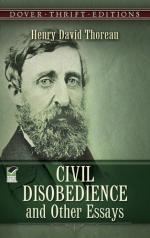|
This section contains 662 words (approx. 3 pages at 300 words per page) |

|
Henry David Thoreau's On Civil Disobedience"
Summary: Provides an analysis of Henry David Thoreau's "On the Duty of Civil Disobedience."
During his extended residency on Walden Pond of the Brook Farm, Henry David Thoreau was arrested for failure to pay taxes. His response to this incident was the essay "Civil Disobedience," in which he observed, "There is but little virtue in the action of masses of men." Thoreau was a Transcendentalist, who believed that individual conscience and intuition should take precedence over secular law. Thoreau believed that the best government is one which "governs least," a philosophy subscribed to by Federalists such as Alexander Hamilton. The wisdom of Thoreau's statement becomes evident when examining the theories of social psychology and important historical events.
Social Psychology is the study of the mental and behavioral processes that result from the interaction of people. The informational social influence theory describes humans as beings who are influenced by their willingness to accept others opinions about reality. The conclusion of a study performed...
|
This section contains 662 words (approx. 3 pages at 300 words per page) |

|


